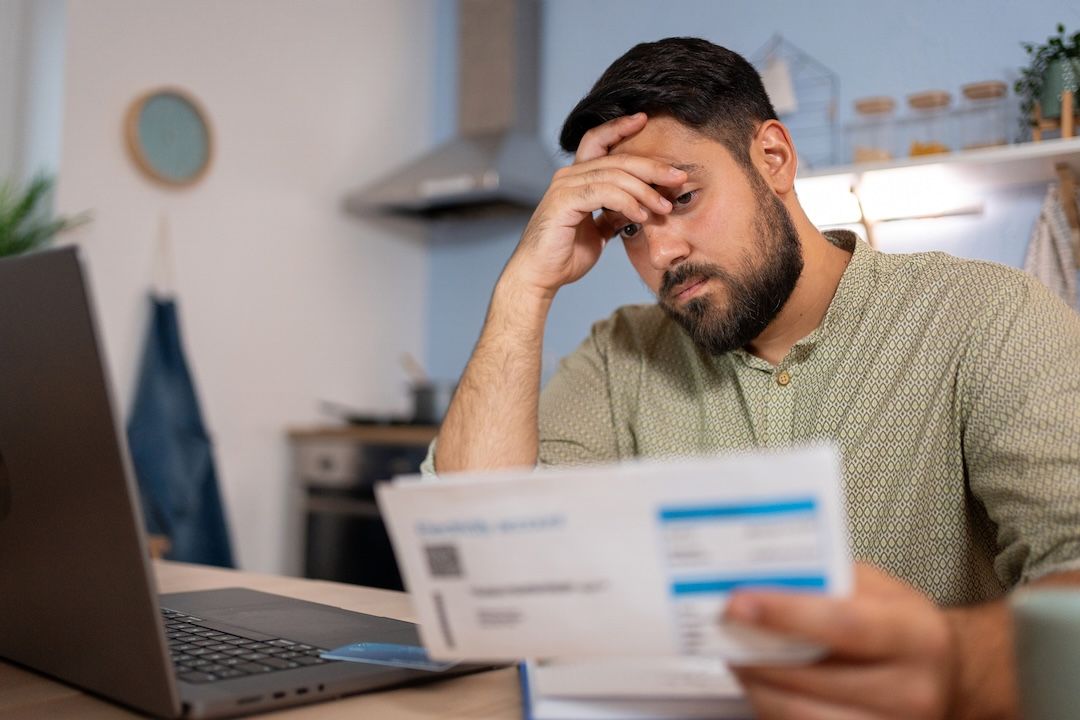How to Get Back on Track After Missing Debt Payments

- Anyone can fall behind on debt payments, but it’s entirely possible to recover and get back on track.
- Start with a complete financial assessment. You’ll need to figure out how much money you can devote to getting caught up.
- Negative consequences of missed payments get worse as time goes by. The best way to limit the financial and credit damage is to act as quickly as possible.
- If you’re overwhelmed, it’s a good idea to get professional debt relief help.
Table of Contents
Life happens, and sometimes financial plans go off course. Falling behind on debt payments is a detour, not a permanent situation. Every financial challenge is an opportunity to learn new skills and create positive momentum. You have the power to turn things around, and every step you take could put you closer to a better financial future.
This moment is your financial reset button. You can get caught up and make your accounts current again. There’s a solution for every debt problem. Let’s discuss ways to get back on track after missing debt payments.
Steps to Get Back on Track After Missing Debt Payments
Past-due payments don’t have to keep you from thriving financially—you can recover. Ready to take action? Here's how to start getting back on track after missing debt payments:
Review your expenses and overdue payments
As a first step, outline your monthly income and expenses.
List each expense. It’s easier if you usually use debit or credit cards because you can review a few recent statements for each account. If you usually pay cash, list your expenses as well as you can, and start keeping a journal right away. Write down every transaction, no matter how small.
Also, list all of your debt payments, including the required payment amount, the due date, and whether it’s current or late. Subtract your expenses and debt payments from your monthly income to determine how much money you could put toward catch-up payments.
For late debt payments, note the total amount that you need to pay to bring the account current.
Look for ways to reduce your expenses
Look for opportunities to trim your spending to free up money for debt payments.
Are there any expenses that you could cancel or pause, such as subscriptions or memberships? Could you give yourself a modest grocery budget for a month and avoid eating in restaurants? Could you do a spending freeze?
Another way you may be able to reduce expenses is by negotiating with service providers. Call up your home internet and cell phone providers to ask if there’s a better pricing plan available.
Most people have to make sacrifices and change their spending habits to get out of debt. But those sacrifices don’t have to be forever.
Increase your income
You may be able to catch up on payments sooner by increasing your income so you can put extra money toward your overdue debts.
Here are some ideas to boost your earnings:
Get a part-time job
Ask for a raise or more hours
Turn a hobby or skill into a side hustle
Sell unwanted items around your home
Pay necessary expenses while prioritizing repaying past-due debts
Now it's time to catch up on payments. After your basic expenses, including your regular debt payments, are paid, attack the late debts. Every dollar you save and every extra dollar you bring in should go towards getting those late debts caught up. Use a budget worksheet or a budgeting app to track your progress.
What Happens When You Miss a Debt Payment?
Missing a debt payment typically leads to late fees. You might also get hit with a higher interest rate.
Once your account is 30 days past due, your credit profile is likely to take a hit. The damage is worse if an account falls 60 or 90 days behind. After that, the account is seriously delinquent.
Freedom Debt Relief isn't a Credit Repair Organization and doesn't provide, or offer services or advice to repair, modify, or improve your credit.
What happens to the account if you miss a payment?
A missed debt payment could result in a late fee. Your lender or creditor may also increase your interest rate as a penalty. Both of these increase the amount of money you owe. If you’ve never been late before, immediately call your creditor and ask them to waive the fees and penalties.
After 90 days, the account is seriously delinquent. It could be charged off, which means your creditor considers it uncollectible. The debt is likely to be handed over to the collections department or a collection agency.
What happens to your credit score when you don’t pay your debts?
Missed debt payments typically impact your credit standing and reduce your credit score. Missed payments can remain on your credit report for up to seven years.
Financial consequences of missing debt payments
If you've stopped making payments on your debts, your accounts may go into default. However, an account won't go into default overnight.
Typically, you must have missed payments for an extended period for your debt to be considered in default. For example, credit card and personal loan debts usually go into default after three to six months of missed payments.
Defaulting on debt can lead to negative consequences. It can impact your ability to qualify for credit in the future. If you don’t bring the account up to date, you could be sued for the debt. If you lose a debt lawsuit, the judge could order your employer to send part of your paycheck to the court until the debt is paid off. This is called wage garnishment.
If you have secured debt (debt backed by collateral) like an auto loan or a mortgage, you risk having your property repossessed and sold to cover the debt.
If you need debt relief in California (or anywhere else in the country), explore your options. The first step is the most important one—find out more today.
What If You Can’t Afford to Catch Up on Your Missed Payments?
If you can’t cover your bills with the money you earn, you have a more serious problem. Here are some solutions to explore to help you get back on track with your finances.
Contact your lenders and creditors
Contact your creditors and lenders immediately if you can't afford to make payments. They may offer a temporary solution if you're experiencing financial hardship.
Consider debt settlement
If you can’t afford to fully repay your debts, your creditors might agree to clear your debt for less than the full amount. This is called debt settlement. It may be an option if you have unsecured debts like credit cards or personal loans that you're struggling to repay.
You can negotiate a debt settlement with your own creditors. It usually takes persistence and several rounds of communication. If you don’t feel comfortable negotiating, you have the option of working with a professional debt settlement company.
This type of debt relief could significantly reduce what you owe and help you get your finances back on track. It’s for people experiencing financial hardship who intended to fully repay their debts but can’t.
Moving Forward After Falling Behind on Debts
If you've fallen behind on debt payments, you're not alone. Temporary setbacks happen, but they don't have to define you or negatively impact your life forever. You can move forward and get your finances back on track. Freedom Debt Relief is ready to help if you're feeling stuck.
A look into the world of debt relief seekers
We looked at a sample of data from Freedom Debt Relief of people seeking the best debt relief company for them during December 2025. This data highlights the wide range of individuals turning to debt relief.
Credit card tradelines and debt relief
Ever wondered how many credit card accounts people have before seeking debt relief?
In December 2025, people seeking debt relief had some interesting trends in their credit card tradelines:
The average number of open tradelines was 14.
The average number of total tradelines was 25.
The average number of credit card tradelines was 7.
The average balance of credit card tradelines was $15,142.
Having many credit card accounts can complicate financial management. Especially when balances are high. If you’re feeling overwhelmed by the number of credit cards and the debt on them, know that you’re not alone. Seeking help can simplify your finances and put you on the path to recovery.
Home-secured debt – average debt by selected states
According to the 2023 Federal Reserve Survey of Consumer Finances (SCF) (using 2022 data) the average home-secured debt for those with a balance was $212,498. The percentage of families with mortgage debt was 42%.
In December 2025, 25% of the debt relief seekers had a mortgage. The average mortgage debt was $236504, and the average monthly payment was $1882.
Here is a quick look at the top five states by average mortgage balance.
| State | % with a mortgage balance | Average mortgage balance | Average monthly payment | |
|---|---|---|---|---|
| California | 20 | $391,113 | $2,710 | |
| District of Columbia | 17 | $339,911 | $2,330 | |
| Utah | 31 | $316,936 | $2,094 | |
| Nevada | 25 | $306,258 | $2,082 | |
| Massachusetts | 28 | $297,524 | $2,290 |
The statistics are based on all debt relief seekers with a mortgage loan balance over $0.
Housing is an important part of a household's expenses. Remember to consider all your debts when looking for a way to get debt relief.
Manage Your Finances Better
Understanding your debt situation is crucial. It could be high credit use, many tradelines, or a low FICO score. The right debt relief can help you manage your money. Begin your journey to financial stability by taking the first step.
Show source
Author Information

Written by
Natasha Etzel
Natasha is a contributing writer for Freedom Debt Relief. She is a veteran professional financial writer. She provides realistic strategies to help readers improve their knowledge and change their financial situations.

Reviewed by
Kimberly Rotter
Kimberly Rotter is a financial counselor and consumer credit expert who helps people with average or low incomes discover how to create wealth and opportunities. She’s a veteran writer and editor who has spent more than 30 years creating thousands of hours of educational content in every possible format.
What should you do if a bill comes due and you can't afford to pay it?
If you know you can't afford a bill, contact the lender or creditor immediately. They may provide a temporary solution if you're experiencing financial difficulties. For example, your lender might offer to temporarily pause payments to give you some breathing room. It's best to be upfront about your situation and ask for help before you fall behind on payments.
How do I get back on track with debt?
There are two ways to get ahead financially: Spend less or earn more (or both). The idea is to free up more money to put toward debt repayment. Paying more on your unpaid debts could help you get your accounts current sooner. If you can’t get a handle on your debt no matter what you try, explore debt settlement. This is when you convince your creditor to accept less than the full amount you owe but consider it payment in full.
How can I rebuild my credit after missed payments?
After getting caught up, prioritize making on-time payments. Your payment history influences your credit standing more than any other factor.